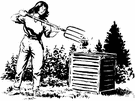compost
(redirected from composts)Also found in: Thesaurus, Encyclopedia.
com·post
(kŏm′pōst′)n.
A mixture of organic matter, as from leaves and manure, that has decayed or has been digested by organisms, used to improve soil structure and provide nutrients.
tr.v. com·post·ed, com·post·ing, com·posts
1. To convert (vegetable matter) to compost.
2. To fertilize with compost.
[Middle English composte, from Old French, mixture, compost, from Latin compositum, mixture, from neuter past participle of compōnere, to put together; see component.]
American Heritage® Dictionary of the English Language, Fifth Edition. Copyright © 2016 by Houghton Mifflin Harcourt Publishing Company. Published by Houghton Mifflin Harcourt Publishing Company. All rights reserved.
compost
(ˈkɒmpɒst)n
1. (Agriculture) a mixture of organic residues such as decomposed vegetation, manure, etc, used as a fertilizer
2. (Horticulture) a mixture, normally of plant remains, peat, charcoal, etc, in which plants are grown, esp in pots
3. rare a compound or mixture
vb (tr)
4. (Agriculture) to make (vegetable matter) into compost
5. (Agriculture) to fertilize with compost
[C14: from Old French compost, from Latin compositus put together; see composite]
Collins English Dictionary – Complete and Unabridged, 12th Edition 2014 © HarperCollins Publishers 1991, 1994, 1998, 2000, 2003, 2006, 2007, 2009, 2011, 2014
com•post
(ˈkɒm poʊst)n.
1. a mixture of decaying organic matter, as decomposing leaves, manure, kitchen scraps, etc., used for fertilizing soil.
2. a composition; compound.
v.t. 3. to use in compost; make compost of.
4. to apply compost to (soil).
[1350–1400; Middle English < Anglo-French, Middle French < Latin compositum, compositus composite; compare compote]
com′post•a•ble, adj.
com′post•er, n.
Random House Kernerman Webster's College Dictionary, © 2010 K Dictionaries Ltd. Copyright 2005, 1997, 1991 by Random House, Inc. All rights reserved.
com·post
(kŏm′pōst′) A mixture of decayed or decaying organic matter used to fertilize soil. Compost is usually made by gathering plant material, such as leaves, grass clippings, and vegetable peels, into a pile or bin and letting it rot. Manure and other substances are often added to enrich the mixture or to speed its decomposition.
The American Heritage® Student Science Dictionary, Second Edition. Copyright © 2014 by Houghton Mifflin Harcourt Publishing Company. Published by Houghton Mifflin Harcourt Publishing Company. All rights reserved.
compost
Past participle: composted
Gerund: composting
| Imperative |
|---|
| compost |
| compost |
Collins English Verb Tables © HarperCollins Publishers 2011
compost
1. A material either based on loam, peat or a peat substitute, such as coir, used for potting up plants in containers.
2. An organic material that results from the decomposition by bacteria and fungi of waste matter, such as grass clippings, prunings and leaves. It can be incorporated into the soil to act as a soil improver or used as a mulch.
Dictionary of Unfamiliar Words by Diagram Group Copyright © 2008 by Diagram Visual Information Limited
ThesaurusAntonymsRelated WordsSynonymsLegend:
Switch to new thesaurus
| Noun | 1. |  compost - a mixture of decaying vegetation and manure; used as a fertilizer compost - a mixture of decaying vegetation and manure; used as a fertilizercomposition - a mixture of ingredients |
| Verb | 1. | compost - convert to compost; "compost organic debris" convert - change the nature, purpose, or function of something; "convert lead into gold"; "convert hotels into jails"; "convert slaves to laborers" |
Based on WordNet 3.0, Farlex clipart collection. © 2003-2012 Princeton University, Farlex Inc.
compost
noun fertilizer, mulch, humus A wormery produces excellent compost.
Collins Thesaurus of the English Language – Complete and Unabridged 2nd Edition. 2002 © HarperCollins Publishers 1995, 2002
Translations
خَليطٌ من الأوْراق والرَّوْث للتَّسْميد
kompostkompostovat
kompost
komposzt
safnhaugaáburîur
kompostas
komposts
kompostkompostere
kompostkompostovať
Collins Spanish Dictionary - Complete and Unabridged 8th Edition 2005 © William Collins Sons & Co. Ltd. 1971, 1988 © HarperCollins Publishers 1992, 1993, 1996, 1997, 2000, 2003, 2005
Collins English/French Electronic Resource. © HarperCollins Publishers 2005
compost
Collins German Dictionary – Complete and Unabridged 7th Edition 2005. © William Collins Sons & Co. Ltd. 1980 © HarperCollins Publishers 1991, 1997, 1999, 2004, 2005, 2007
Collins Italian Dictionary 1st Edition © HarperCollins Publishers 1995
compost
(ˈkompost) , ((American) -poust) noun rotting vegetable matter etc used as fertilizer.
Kernerman English Multilingual Dictionary © 2006-2013 K Dictionaries Ltd.